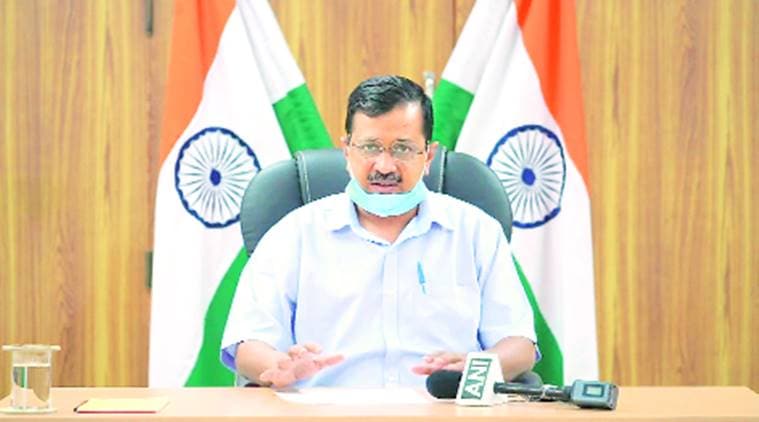 CM Arvind Kejriwal addresses the webcast, Friday.
CM Arvind Kejriwal addresses the webcast, Friday.
There is adequate availability of beds for Covid patients in the capital, Delhi Chief Minister Arvind Kejriwal said Friday, adding that the situation has been brought “under control” by attaching hotels with hospitals. The fact that most patients are showing mild symptoms, who do not require hospitalisation, is also encouraging, he said.
Currently, out of 13,240 beds for Covid patients across five state government-run, five Centre-run and 116 private hospitals in the city, 6,100 are occupied, according to the corona dashboard.
“Over the last one week, the daily average of beds occupied in hospitals has remained around 6,000. Over 3,000 new cases are being registered every day, but not many are requiring hospitalisation. In Delhi, people infected with the virus are showing mild symptoms,” Kejriwal said.
In the five government hospitals, 1,424 out of 4,119 beds are occupied; 1,094 out of 2,022 beds at five Centre-run hospitals are full; 3,582 out of 7,099 beds at 116 private health facilities are taken. The capacity of many private hospitals has risen on account of them being attached with hotels that are serving as extensions.
The Delhi Cabinet Friday also gave necessary approvals to operationalise another government hospital at Burari, with 450 beds.
With 3,460 new cases on Friday, taking the total to 77,240, Delhi continues to remain the city with the highest case load in the country. The city also saw 63 deaths, taking the toll to 2,492.
While expressing satisfaction with the number of beds available, the CM underlined that more ICU beds are likely to be needed in the coming days. There are currently 744 ICU/ventilator beds, out of which 167 are in four Delhi government hospitals, 185 in five hospitals under the Centre, and 392 in 74 private hospitals.
“We are also creating ICU beds. We are not sitting idle. Over 3,500 beds have been laid at hotels attached to hospitals over the last 10 days, which is why the number of beds has increased. More banquet halls are being prepared. We are preparing for tomorrow, for the day after. There was a shortage of beds during the first week of June. I used to attend calls throughout the night, trying to arrange beds for people. The situation is under control now,” said Kejriwal.
There will be more ICU beds at Lok Nayak, GTB and Rajiv Gandhi Super Speciality hospitals in the coming days, he said.
Kejriwal said the city is recording above 3,000 cases almost every day as more tests are being conducted: “When we were carrying out 5,000-6,000 tests in the city, around 2,000-2,500 positive cases used to come up. Now that 18,000-20,000 tests are getting conducted, cases are naturally on the rise.”
The CM said the government has managed to provide all patients under home isolation with oximeters to help them monitor oxygen saturation levels. “The ideal saturation level is 95%. Anything below 90 is considered dangerous, and severe if concentration drops below 85. People have been provided oximeters so that they can call us if levels dip below 95. The government will arrange oxygen cylinders for them and shift to hospitals if required,” he said.
Attendant allowed
The Delhi government has directed all Covid hospitals to permit one attendant per patient in the premises, a move which will ease the communication gap between families and patients. Till now, no attendant was allowed to enter the premises of the hospital where a Covid-19 patient was admitted.
The decision comes days after the Supreme Court suggested a series of measures to improve patient care in Covid-19 hospitals.
The government has also reiterated and asked all Covid hospitals to install CCTV cameras. The CCTV footage has to be made available to the inspecting/supervising expert team formed by the Government of India.